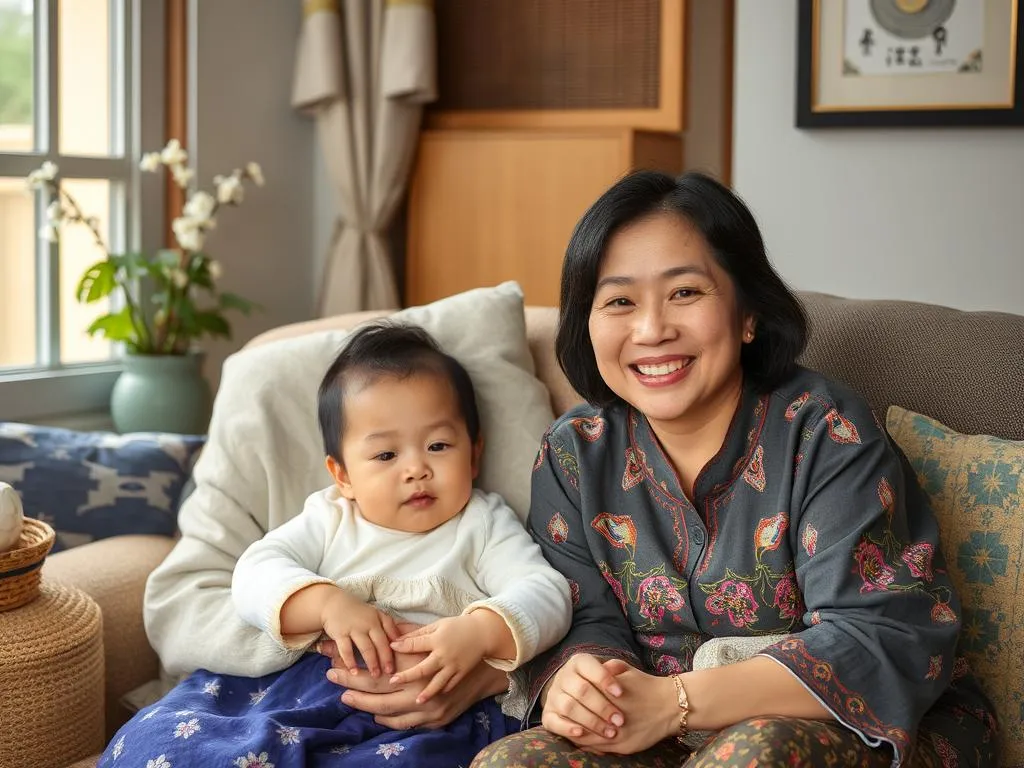When we think of home, our minds often wander to the warmth and comfort of our mother’s embrace. In the rich tapestry of Korean spirituality, the concepts of home and mother hold a profound and intricate meaning, deeply intertwined with the very essence of identity, belonging, and the human experience. Join us as we explore the captivating spiritual significance of ‘home and mother’ in Korean culture.
The home and mother korean spiritual meaning is a testament to the enduring power of familial bonds and the sacred nature of the domestic sphere. For Koreans, the home is not merely a physical structure, but a sacred space that embodies the spirit of the family, a sanctuary where the past, present, and future converge. The mother, in this context, is revered as the heart and soul of the home, a guiding light whose unwavering love and nurturing spirit imbue the very walls with a sense of belonging and security.
Key Takeaways
- The Home as a Sacred Space: In Korean spirituality, the home is seen as a sacred space, a sanctuary where the family’s history, traditions, and values are preserved and passed down through generations.
- The Mother as the Heart of the Home: The mother is revered as the embodiment of the home, her nurturing spirit and unconditional love shaping the very essence of the domestic realm.
- The Importance of Familial Bonds: Korean spirituality emphasizes the deep, interconnected nature of family, with the home serving as the epicenter of this profound sense of belonging and community.
- The Concept of ‘Jeong’: The Korean concept of ‘jeong’ – a deep, emotional connection and sense of empathy – is deeply rooted in the spiritual significance of home and mother.
The Home as a Sacred Space
In the realm of Korean spirituality, the home is not merely a physical structure, but a sacred space that embodies the very essence of the family. It is a place where the past, present, and future converge, a sanctuary where the family’s history, traditions, and values are preserved and passed down through generations.
The home and mother korean spiritual meaning is deeply rooted in the belief that the home is a reflection of the family’s collective spirit. Every nook and cranny, every object and ritual, holds a symbolic significance, weaving a tapestry of shared experiences and ancestral wisdom. The home becomes a living, breathing entity, a canvas upon which the family’s story is painted.
The Mother as the Heart of the Home
At the very heart of the home and mother korean spiritual meaning is the revered figure of the mother. In Korean culture, the mother is seen as the embodiment of the home, her nurturing spirit and unconditional love shaping the very essence of the domestic realm.
The mother is the keeper of the family’s traditions, the guardian of its collective memory, and the conduit through which the ancestral wisdom is passed down. Her unwavering presence and tireless devotion to her family imbue the home with a sense of warmth, security, and belonging that transcends the physical boundaries of the structure itself.
The Importance of Familial Bonds
The home and mother korean spiritual meaning is deeply rooted in the profound significance of familial bonds. In Korean spirituality, the home is not just a place, but a living, breathing entity that represents the interconnectedness of the family.
The home is the epicenter of this profound sense of belonging, a place where individual identities are woven into the collective tapestry of the family. It is a space where the past and present converge, where the echoes of ancestral voices resonate with the laughter of the present generation.
The Concept of ‘Jeong’
At the heart of the home and mother korean spiritual meaning lies the Korean concept of ‘jeong’ – a deep, emotional connection and sense of empathy that transcends the boundaries of the physical world. This profound bond, forged through shared experiences, hardships, and joys, is the glue that holds the family together.
‘Jeong’ is the invisible thread that connects the members of the family, binding them in a web of emotional and spiritual interdependence. It is the reason why the home holds such immense spiritual significance, for it is within these walls that the bonds of ‘jeong’ are nurtured and strengthened, passed down from generation to generation.
The Spiritual Significance of Rituals and Traditions
In the home and mother korean spiritual meaning, the rituals and traditions that take place within the domestic sphere hold profound spiritual significance. These practices, rooted in the family’s ancestral wisdom, serve as a bridge between the physical and the metaphysical, connecting the present to the past and the living to the revered spirits of the ancestors.
From the daily routines of preparing meals to the ceremonial honoring of elders, each act becomes a sacred ritual, imbued with layers of meaning and symbolism. The home becomes a sacred stage, where the family’s collective spirit is celebrated and strengthened through the observance of these timeless traditions.
The Role of Ancestor Veneration
In the home and mother korean spiritual meaning, the veneration of ancestors holds a central place. The home is not just a dwelling for the living, but a space where the spirits of the departed are believed to reside and participate in the family’s daily life.
Through rituals and offerings, the family maintains a constant dialogue with their ancestors, seeking guidance, blessings, and a deeper connection to their roots. The home, in this context, becomes a sacred gateway, a place where the boundaries between the physical and the spiritual realms blur, allowing for a profound, transcendent experience of family and belonging.
The Transformative Power of the Home
The home and mother korean spiritual meaning extends beyond the confines of the physical structure, for it is a testament to the transformative power of the domestic sphere. Within the walls of the home, individuals find refuge, nourishment, and the opportunity to cultivate their true selves.
It is here, in the embrace of the mother’s love and the warmth of the family’s collective spirit, that one’s identity is forged and nurtured. The home becomes a crucible, where the challenges of the outside world are met with the unwavering support and guidance of the family.
Conclusion
The home and mother korean spiritual meaning is a testament to the enduring power of familial bonds and the sacred nature of the domestic sphere. In the rich tapestry of Korean spirituality, the home is not just a physical structure, but a living, breathing entity that embodies the family’s collective spirit, a sanctuary where the past, present, and future converge.
The mother, revered as the heart and soul of the home, is the embodiment of this profound sense of belonging and the keeper of the family’s traditions. Through the observance of rituals and the veneration of ancestors, the home becomes a sacred gateway, a place where the boundaries between the physical and the spiritual realms blur, allowing for a transformative experience of family and identity.
As we delve deeper into the home and mother korean spiritual meaning, we are reminded of the universal human need for a sense of belonging, a place to call home. In the Korean tradition, this need is not just physical, but deeply spiritual, a testament to the enduring power of the family and the transformative nature of the domestic realm.








